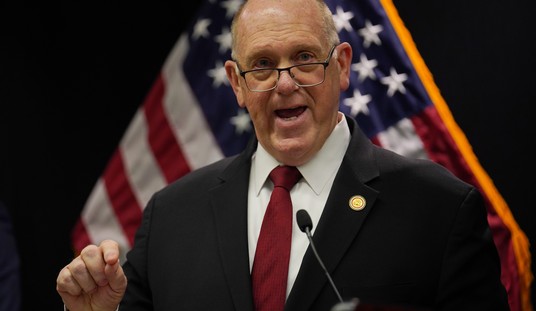If the White House thought they needed to spin yesterday’s news, get ready for the whirling dervishes they’ll need to break out today. Record inflation will continue even longer, as the producer-price index (PPI) usually offers a forward look at the economy for the next few months. And that outlook looks even more grim than it did yesterday, with a new all-time record high 11.2% year-on-year for PPI inflation:
The Producer Price Index for final demand increased 1.4 percent in March, seasonally adjusted, the U.S. Bureau of Labor Statistics reported today. This rise followed advances of 0.9 percent in February and 1.2 percent in January. (See table A.) On an unadjusted basis, final demand prices moved up 11.2 percent for the 12 months ended in March, the largest increase since 12-month data were first calculated in November 2010.
In March, the rise in the index for final demand was led by a 2.3-percent advance in prices for final demand goods. The index for final demand services increased 0.9 percent.
Prices for final demand less foods, energy, and trade services moved up 0.9 percent in March, the largest advance since rising 1.0 percent in January 2021. For the 12 months ended in March, the index for final demand less foods, energy, and trade services increased 7.0 percent.
The 12-month inflation rate for final-demand goods hit nearly 16%, and month-on-month rose 2.3%. Final-demand services rose more slowly at 0.9% in March and under 7% year-on-year, but transportation services and business supplies increased more rapidly. That was driven in large part by skyrocketing prices for oil-based products:
A 22.7-percent jump in margins for fuels and lubricants retailing was a major factor in the March advance in prices for final demand services. The indexes for truck transportation of freight; traveler accommodation services; airline passenger services; inpatient care; and hardware, building materials, and supplies retailing also increased. Conversely, prices for securities brokerage, dealing, and investment advice decreased 5.4 percent. The indexes for portfolio management and for automobile retailing (partial) also moved lower.
You know what might help with that? More drilling and refining. Thus far, however, Joe Biden and his administration won’t rescind EO 13990 that he fully intended as a restriction on exploration, extraction, and refining.
CNBC notes that the report missed expectations that were already pessimistic:
The prices that goods and services producers receive rose in March at the fastest pace since records have been kept, the Bureau of Labor Statistics reported Wednesday.
The producer price index, which measures the prices paid by wholesalers, increased 11.2% from a year ago, the most in a data series going back to November 2010. On a monthly basis, the gauge increased 1.4%, above the 1.1% Dow Jones estimate and also a new record. …
PPI is considered a forward-looking inflation measure as it tracks prices in the pipeline for goods and services that eventually reach consumers.
Wednesday’s release comes the day after the BLS reported that the consumer price index for March surged 8.5% over the past year, above expectations and the highest reading since December 1981.
Both CNBC and the Wall Street Journal called this a signal of a continuing supply-chain crisis. That has been exacerbated by war in Europe as well as the new COVID-19 lockdowns in China:
The upswing in producer prices was a signal that supply-chain disruptions continued to drive up prices, exacerbated by rising energy and commodities prices caused by Russia’s invasion of Ukraine. China also has locked down parts of the country in recent weeks as Covid-19 cases hit a pandemic record there, leading to the potential for additional supply disruptions. …
The producer-price index measures what suppliers are charging businesses and other customers. The index generally captures the changes in input costs that producers are facing. Those don’t necessarily feed directly into the prices consumers pay, though they can reflect inflation pressure building throughout the production pipeline.
Economists are watching the numbers closely for signs that inflation pressures are easing. They also are keeping an eye on the PPI to predict the trajectory of the Fed’s preferred inflation measure, the personal-consumption-expenditures price index, which is drawn largely from the consumer-price index, but also from certain components from the PPI.
The so-called core PCE price index, which excludes volatile food and energy costs, rose 5.4% in February from a year earlier, the biggest increase since 1983 and up from a 5.2% increase for the year through January.
March’s increase suggested that businesses continue to struggle with high costs and will likely continue to pass on those costs to consumers in coming months.
Supply chain disruptions didn’t just start last month. Furthermore, neither did PPI inflation or CPI inflation for that matter either. We are now coming to a point where year-on-year inflation numbers will have a higher basis, which could end up making the next couple of months look better by comparison. However, given the trajectory for March-on-March, it’s more likely that we will continue to see these higher numbers, which will actually underestimate their impact on consumers thanks to the higher basis prices on which the year-on-year comparisons will be made.
All of this will put a lot of pressure on the Federal Reserve to start dramatically tightening the money supply. That almost certainly would lead to a recession of some degree, thanks to the delays in reacting to inflation on both a monetary and energy policy basis. If Biden wants to avoid the recession, he needs to cut the red tape on oil exploration, extraction, and refining ASAP to get cheaper oil and eliminate the fuel price increases that act as exponential multipliers on inflation. Instead, Jazz will next discuss what Biden is actually doing.








Join the conversation as a VIP Member